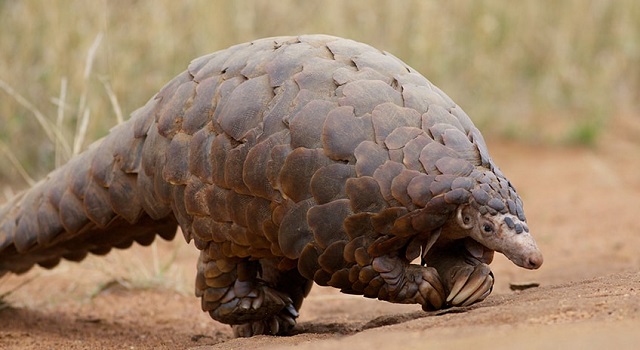
On the hunt for traffickers of the hard scaled mammal
Kampala, Uganda | RONALD MUSOKE | Ugandan conservationists are determined to fight back against a poaching assault on the pangolin, a small, long-nosed mammal with large overlapping keratin scales and the focus of a multi-billion dollar illicit business, fuelled by soaring Chinese demand.
Wildlife campaigners around the world accuse China, where pangolin meat is a delicacy and its scales are an important component in traditional medicine, of pushing it towards extinction.
An investigation into the illicit trade took us to Corner Kamdini; a bustling, small trading centre 300 km north of Kampala and a popular refreshment stop for travelers to northern Uganda.
We had been told that Corner Kamdini has a thriving trade in illicit wildlife meat and products thanks to its location adjacent to Uganda’s biggest wildlife reserve; the 5,360 sq. km Murchison Falls Conservation Area straddling the River Nile.
Hawkers offer fruit, bottled drinks, and skewers of sizzling chicken and goat meat to those passing through. But our focus was on pangolins; described by conservationists as the most trafficked mammal in the world.
In addition to the meat, Chinese consumers also prize the powder from ground pangolin scales, made of keratin, like human fingernails, and reputed to cure cancer and asthma.
Although they are now protected by an international ban, the International Union for Conservation of Nature (IUCN) estimates a million pangolins may have been sold across international borders over the last decade. It is now categorised as “critically endangered” by the IUCN and appears on its Red List of Threatened Species.There are up to eight species of pangolins scattered across South-East Asia and sub-Saharan Africa and zoologists say they are among the most reclusive mammals on earth.
In Uganda, part of the “pangolin belt” of central Africa, the mammal is endemic to the Murchison Falls National Park and areas of northern and northwestern Uganda.
A 2016 report by the global conservation NGO, WildAid, estimated that products harvested from 4,340 pangolins were trafficked from Uganda in the past year.
Some northern residents and conservationists have suggested that the trade in live pangolin, meat and scales has been spurred by an influx of Chinese workers. Corner Kamdini is repeatedly mentioned because of a sizeable number of Chinese dam construction workers at Karuma. Close to 700 Chinese have been part of a 6,000 strong workforce since December, 2013.
Scanty evidence
But evidence of such a link is scanty and most people in the region discounted the notion.
Most residents of Karuma we encountered said they saw pangolins once in a while. Pangolins are a delicacy here too; especially among older people. Their scales are believed to have healing properties and can be used to vaccinate children against measles. When polished, the scales are used as ornaments.
After several days, we uncovered what appeared to be a link to illicit trade when a bodaboda (motorcycle taxi) rider identified a pangolin from a photograph and offered to take us to an elderly man he said collected scales of okong- the word for pangolin in the local Luo dialect. But when we got to our destination, we were told the man had moved.
We got closer to the nub of the issue when we received a call from a resident we had met earlier saying a friend could get us a pangolin within a day or two. But he switched off his phone when we told him that we were not buyers.
So why is it so difficult to find evidence of pangolin trade?
Brian Opio, the chairman of Kamdini Local Council, said a recent crackdown had made traffickers wary.
“Residents are aware of the trade but feign ignorance to avoid arrest,” Opio tells us, “Most of the people in the community are aware of the heavy crackdown on pangolin poachers.”
In a sting operation in March, undercover wildlife authority officials arrested a resident in the nearby village of Nora with 13 kg of scales.
And in August, four Chinese nationals were arrested at Entebbe Airport in possession of trafficked scales. Initially caught for trafficking in ivory, the police said they found seven pieces of scales in the ivory consignments and more was found in the rooms of two suspects.
One investigator told us that it was the first time Chinese nationals were found in possession of pangolin scales from Karuma.
Still, it is believed that Uganda is a target for traffickers because it has all four of the African genus of the pangolin.
John Otim, 80, of Tenam village near Kamdini, was a hunter until he retired in the early 1990s. He says pangolins started dwindling in the national park around 1982, along with other species.
“I last captured a pangolin in 1988. It was also the last time I ate pangolin meat and yet in the 1960s I would find pangolins daily in Tenam,” he said.
 The Independent Uganda: You get the Truth we Pay the Price
The Independent Uganda: You get the Truth we Pay the Price


